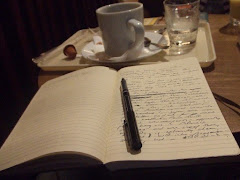
Many of the most innovative thinkers and writers in history have been polymaths, individuals who were well-versed in several fields of study rather than focused on a single one. There is a long tradition of respect for the contributions of generalists to human knowledge: generalists have been called - forgive the gendered language - "Renaissance men," "men of letters," "humanists," "philosophes," "essayists," and "public intellectuals (or simply "intellectuals")."
Individuals in this tradition have included, to list only a few, Benjamin Franklin, Thomas Jefferson, Thomas Paine, and other leading lights of the American Revolution, philosopher Bertrand Russell, essayists Michel de Montaigne, Susan Sontag, and Ralph Waldo Emerson, and Thomas Mann's fictional character Settembrini. I have listed a few others on the sidebar of this blog, in the section "Self-educators, polymaths, and lovers of learning." The list is potentially endless, and it includes many religious and conservative as well as secular and liberal individuals. The work of many generalists and public intellectuals in recent centuries has been rooted in Enlightenment values of reason, inquiry, the exchange of ideas, and a belief in the power of education, communication, and the written word.

Even in an era in which scholarly labor is divided and academic and economic specialization is the norm, generalism lives on in the form of the traditions of liberal education, of opinion columnists (David Brooks, Chris Hedges, Christopher Hitchens) who draw on resources from many disciplines, of scholars like Cass Sunstein, Peter Berkowitz, and Martha Nussbaum whose work moves fluidly across disciplinary boundaries, in broad-minded publications like the Economist, the New Yorker, and the American Scholar, and in institutions like the Institute for Advanced Study at Princeton and the Committee on Social Thought at the University of Chicago.
There is a close relationship between generalism and self-education. Those of us who are interested in several or many subjects cannot realistically get an academic degree in each area that we want to pursue, so we have to pursue most of our learning on our own initiative, for no grade or diploma.
Personally, I am interested in disciplines across the humanities and social sciences, including politics, literature, history, philosophy, religion, education, and law. I also hope to read as many "great books" (and good books, as I like to call deserving works that have not made their way into the canon) as I can manage, and I enjoy studying languages.
Is this realistic - or is having too many interests a surefire path to dilettantism and amateurism? Reasonable minds will decide differently. Certainly, you can't be an expert in everything, but is it possible to be a competent generalist? I think that the individuals and traditions I mention above suggest that it is possible for generalists to contribute effectively to the human conversation.
None of this is intended to denigrate specialists in any way. Academic specialists, regardless of their level of public engagement, are called to increase the sum of human knowledge through rigorous, methodologically-sound inquiry into their academic fields. They do the difficult, often lonely work of building the disciplines themselves through extensive research, writing, and discovery. And the disciplines they build are what we know. All I am suggesting is that specialization is not the only way to make a real and meaningful intellectual contribution to the world.
The way to pursue a variety of interests at once is as a self-educator committed to taking advantage of learning opportunities wherever they occur, reading a wide range of high-quality material in one's areas of interest, and engaging with the worlds of scholarship, journalism, and the arts.
But why bother? The self-educators I have been interviewing on this page have offered their own reasons, but speaking personally, I want to see the world through as many lenses as possible. I want to be able to draw on many diverse sources from across times, places, cultures, and disciplines in my writing and teaching. And I want to engage fully in the humanist project of "cultivating our garden" and creating a better, happier, freer world through political and social engagement and the spread of good ideas.




